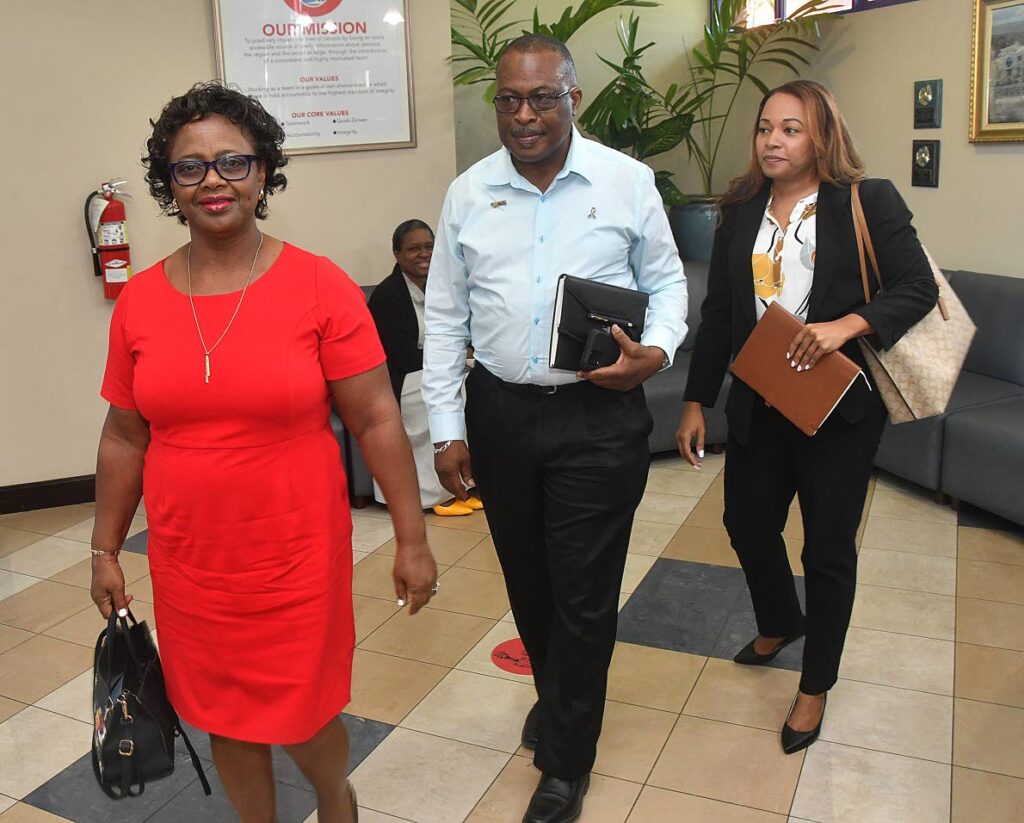Nurse Carol Baker-Burke (left), the Ministry of Health and Wellness’s community mental health coordinator; Dr Kevin Goulbourne (centre), director, mental health and substance abuse in the ministry; and consultant psychiatrist Dr Kristen Robinson-Barrett, director of treatment services at the National Council on Drug Abuse, on their way to the Jamaica Observer executive boardroom for this week’s Jamaica Observer Monday Exchange which explored the issue of mental health, ahead of World Mental Health Day, being observed on Friday, October 10, 2025. (Photo: Garfield Robinson)
WITH global statistics indicating that a substantial portion of the population will experience a mental health challenge at some point in their lives, local health officials are calling for a whole-of-society approach to tackle this challenge.
Addressing the latest
Jamaica Observer Monday Exchange as preparations begin to mark World Mental Health Day on Friday, portfolio minister Dr Christopher Tufton argued that this is more of an issue in the population than most people are aware.
According to Tufton, a local study found that four out of every 10 Jamaicans, “at some point in their lives experience a mental health challenge”.
He pointed out that this is broken down into issues such as depression, anxiety disorders, and schizophrenia.
“What it means is that if there are 10 of us in this room, at least four of us would have had some mental health-related issues. And what this does, it raises mental health as perhaps the leading non-communicable disease profile in our population,” Tufton told Observer editors and reporters.
He said the clear inference is that the mental health challenges facing Jamaica need an all-of-society approach.
“It is not an issue that is to be addressed by any one group, any portfolio. The Ministry of Health is the driving force, and should be, but because it is so widespread and because it happens in the homes, in the communities, in the faith-based groups, in the schools, it really requires all of us to have an appreciation for it and to address it,” added Tufton.
He was supported by the ministry’s Community Mental Health Coordinator Nurse Carol Baker-Burke, who told the
Monday Exchange that she fully supports the call for a joined-up approach to deal with the challenges of the mental health issues facing Jamaica.
“To improve our mental health overall as a country we need everybody on board — all the ministries in Government, the private sector and community members, [and] the schools as well,” said Baker-Burke.
In the meantime, the Ministry of Health’s director of mental health and substance abuse Dr Kevin Goulbourne pointed out that people with mental health issues can be treated, become mentally healthy, and resume productivity.
“So they get a chance to be productive, less of a burden on society, and improve their quality of life,” said Dr Goulbourne.
For her part, consultant psychiatrist and director of treatment services at the National Council on Drug Abuse Dr Kristen Robinson-Barrett urged Jamaicans to reach out for help from the many support entities that are in place.
“We just want to encourage persons to start at every level, starting at peer support, starting at the family and the level of the community, as well as the community mental health, before we get to the crisis level, so that we can just have a generally healthier society.
“And so I just want to ensure that everybody knows that the National Council on Drug Abuse is there when it comes to substance use issues so that we can get the prevention side very heavily dealt with,” said Robinson-Barrett.
Meanwhile, the Urban Development Corporation (UDC) is urging Jamaicans to give focused attention to their mental and physical health.
According to UDC General Manager Bobby Honeyghan, the entity has noted the rise in cases of suicide and is encouraging Jamaicans to be more mindful, to seek help when needed, and to incorporate simple but effective practices into daily life such as healthy eating, regular exercise, adequate rest, and spending time with family, friends, and in nature.
“We want to encourage Jamaicans to step outside of the stress of everyday life, even briefly, and do something that brings peace of mind. Our public attractions, from the beach and walking trail at Harmony Beach Park in Montego Bay, to sitting quietly under the trees with a book, are safe and welcoming spaces for relaxation and renewal,” said Honeyghan.
“There is also the world-famous Dunn’s River Falls and Ocho Rios Bay Beach, and for those in Portland, or even outside of Portland, Reach Falls will be open free of cost to the public on October 17. These spaces give us a chance to pause, to breathe, and to remember that life holds beauty, even in difficult times,” added Honeyghan.
He also pointed to the Portmore Resilience Park, now under development, as another example of the Government’s commitment to building more green and recreational spaces across the island. The park will provide areas for relaxation and walking, as well as facilities for basketball, netball, tennis, and other activities that allow families and friends to spend quality time together while improving their health and well-being.
“The UDC remains committed to creating and preserving public spaces that contribute to the health, healing, and resilience of Jamaicans,” declared Honeyghan.
Health and Wellness Minister Dr Christopher Tufton is about to enter the Jamaica Observer executive boardroom for this week’s Jamaica Observer Monday Exchange at which the issue of mental health was discussed, ahead of World Mental Health Day on Friday, October 10, 2025.Photo: Garfield Robinson

